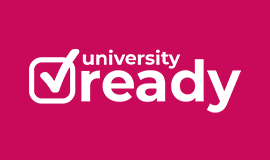-
Second-order differential equations
Learn more to access more details of Second-order differential equationsThis free course is concerned with second-order differential equations. Section 1 introduces some basic principles and terminology. Sections 2 and 3 give methods for finding the general solutions to one broad class of differential equations, that is, linear constant-coefficient second-order differential equations. Section 2 covers homogeneous ...

Free course
16 hours
Level: 2 Intermediate
-
Dynamics
Learn more to access more details of DynamicsThis free course is concerned with moving objects, that is, dynamics. Section 1 introduces concepts like position, velocity and acceleration, which describe the way an object moves. Section 2 discusses Newton’s laws of motion, which predict the motion of an object when the forces acting on it are known. Section 3 shows how Newton’s second law of...

Free course
16 hours
Level: 2 Intermediate
-
Kinematics of fluids
Learn more to access more details of Kinematics of fluidsThis free course examines the basic kinematics of two-dimensional fluid flows. Section 1 introduces the differential equations for pathlines and streamlines. Section 2 introduces a scalar field, called the stream function, which for an incompressible fluid provides an alternative method of modelling the flow and finding the streamlines. Sections 2 ...

Free course
16 hours
Level: 2 Intermediate
-
Number theory
Learn more to access more details of Number theoryThis free course is an introduction to Number Theory. Section 1 provides a brief introduction to the kinds of problem that arise in Number Theory. Section 2 reviews and provides a more formal approach to a powerful method of proof, mathematical induction. Section 3 introduces and makes precise the key notion of divisibility. The Division ...

Free course
16 hours
Level: 2 Intermediate
-
Group theory
Learn more to access more details of Group theoryThis free course consolidates and builds on group theory studied at OU level 2 or equivalent. Section 1 describes how to construct a group called the direct product of two given groups, and then describes certain conditions under which a group can be regarded as the direct product of its subgroups. Section 2 describes the key properties of the ...

Free course
16 hours
Level: 2 Intermediate
-
Linear programming – the basic ideas
Learn more to access more details of Linear programming – the basic ideasThis free course examines the formulation and solution of small linear programming problems. Section 1 deals with the formulation of linear programming models, describing how mathematical models of suitable real-world problems can be constructed. Section 2 looks at graphical representations of two-dimensional models, considers some theoretical ...

Free course
16 hours
Level: 2 Intermediate
-
Modelling and estimation
Learn more to access more details of Modelling and estimationThis free course is concerned with modelling and estimation and looks in particular at the binomial distribution. Section 1 starts by defining probability, introduces relevant notation and briefly discusses basic properties of probabilities. The section concludes by considering some of the general features of and ideas about modelling discrete ...

Free course
16 hours
Level: 2 Intermediate
-
Modelling events in time
Learn more to access more details of Modelling events in timeThis free course develops ideas about probability and random processes. Sections 1 and 2 introduce the fundamental ideas of random processes through a series of examples. Section 3 describes a model that is appropriate for events occurring ‘at random’ in such a way that their rate of occurrence remains constant. Section 4 derives the main ...

Free course
16 hours
Level: 2 Intermediate
-
Point estimation
Learn more to access more details of Point estimationThis free course looks at point estimation, that is, the estimation of the value of the parameter of a statistical model by a single number, a point estimate for the parameter. Section 1 develops some aspects of maximum likelihood estimation. In particular, you will find out how to obtain the maximum likelihood estimator of an unknown parameter,...

Free course
10 hours
Level: 2 Intermediate
-
Bayesian statistics
Learn more to access more details of Bayesian statisticsThis free course is an introduction to Bayesian statistics. Section 1 discusses several ways of estimating probabilities. Section 2 reviews ideas of conditional probabilities and introduces Bayes’ theorem and its use in updating beliefs about a proposition, when data are observed, or information becomes available. Section 3 introduces the main ...

Free course
12 hours
Level: 2 Intermediate
-
Medical statistics
Learn more to access more details of Medical statisticsThis free course is concerned with some of the statistical methods used in epidemiology and more widely in medical statistics. Section 1 introduces cohort studies in which individuals are classified according to their exposure and followed forward in time to evaluate disease outcomes. Section 2 looks at models for cohort studies. Section 3 ...

Free course
16 hours
Level: 2 Intermediate
-
Metric spaces and continuity
Learn more to access more details of Metric spaces and continuityThis free course contains an introduction to metric spaces and continuity. The key idea is to use three particular properties of the Euclidean distance as the basis for defining what is meant by a general distance function, a metric. Section 1 introduces the idea of a metric space and shows how this concept allows us to generalise the notion of ...

Free course
16 hours
Level: 2 Intermediate
-
Surfaces
Learn more to access more details of SurfacesSurfaces are a special class of topological spaces that crop up in many places in the world of mathematics. In this free course, you will learn to classify surfaces and will be introduced to such concepts as homeomorphism, orientability, the Euler characteristic and the classification theorem of compact surfaces.

Free course
20 hours
Level: 3 Advanced
-
Rings and polynomials
Learn more to access more details of Rings and polynomialsThis free course contains an introduction to rings and polynomials. We see that polynomial rings have many properties in common with the integers; for example, we can define a division algorithm, and this enables us to develop the analogue of the highest common factor for two polynomials. Section 1 explores the abstract definitions of a ring ...

Free course
16 hours
Level: 2 Intermediate
-
Interpreting data: Boxplots and tables
Learn more to access more details of Interpreting data: Boxplots and tablesThis free course, Interpreting data: Boxplots and tables, is concerned with two main topics. In Section 1, you will learn about another kind of graphical display, the boxplot. A boxplot is a fairly simple graphic, which displays certain summary statistics of a set of data. Boxplots are particularly useful for assessing quickly the location, ...

Free course
16 hours
Level: 2 Intermediate
-
Working on your own mathematics
Learn more to access more details of Working on your own mathematicsThis free course, Working on your own mathematics, focuses on your initial encounters with research. It invites you to think about how perceptions of mathematics have influenced you in your prior learning, your teaching and the attitudes of learners.

Free course
4 hours
Level: 3 Advanced
-
Working mathematically
Learn more to access more details of Working mathematicallyThis free course, Working mathematically, is aimed at teachers who wish to review how they go about the practice of teaching mathematics, those who are considering becoming mathematics teachers, or those who are studying mathematics courses and would like to understand more about the teaching and learning process.

Free course
10 hours
Level: 3 Advanced
-
Teaching mathematics
Learn more to access more details of Teaching mathematicsThis free course, Teaching mathematics, has been designed for non-specialist mathematics teachers of 8 to 14 year olds, teaching assistants, home schoolers and parents and draws on the established provision of mathematics education at the Open University. It can also be used as Continuing Professional Development by individuals or groups ...

Free course
24 hours
Level: 2 Intermediate
-
Babylonian mathematics
Learn more to access more details of Babylonian mathematicsThis free course looks at Babylonian mathematics. You will learn how a series of discoveries has enabled historians to decipher stone tablets and study the various techniques the Babylonians used for problem-solving and teaching. The Babylonian problem-solving skills have been described as remarkable and scribes of the time received a training ...

Free course
8 hours
Level: 2 Intermediate
-
Egyptian mathematics
Learn more to access more details of Egyptian mathematicsThe Egyptians are known for being ahead of their time in comparison to some civilisations that came after them. This free course, Egyptian mathematics, looks at how the Egyptians solved mathematical problems in everyday life and the technology they used. An understanding of this area has only been possible following the translation of the ...

Free course
9 hours
Level: 2 Intermediate
-
John Napier
Learn more to access more details of John NapierThis free course looks at Scotsman John Napier (1550-1617) and his invention which radically altered the course of mathematics. Napier dabbled in mathematics for over 40 years and near the end of his life he introduced his tables of logarithms which drastically reduced the work needed to do complicated calculations, such as those required in ...

Free course
3 hours
Level: 2 Intermediate

This resource is part of the University Ready hub.
Find more resources like this on the hub homepage.
-
University Ready hub
Learn more to access more details of University Ready hubA collection of resources from all of Wales' universities to help you get started with higher education.

External link
Rate and Review
Rate this article
Review this article
Log into OpenLearn to leave reviews and join in the conversation.
Article reviews